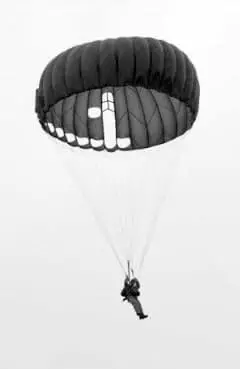There are various meanings of the phrase ‘bale-out’, including ‘making an emergency parachute escape from an aeroplane’ and ‘ladling water from a boat’.
Bale out/bail out
What's the meaning of the phrase 'Bale out'?
What's the origin of the phrase 'Bale out'?
‘Bale out’ and ‘bail out’ are an unusual pair of phrases in that it isn’t the origin or the meaning that is the source of debate, but the spelling. Is it ‘bale out’ or bail out’, and should there be different spellings for the different meanings of the phrase? Those meanings would be a good place to start:
– Make an emergency exit from an aeroplane, using a parachute,
– Ladle water from a boat,
– Liberate from prison, into the security of a guarantor,
– Jump from a surfboard/skateboard/bicycle etc., in order to avoid getting injured,
– Step away from a pitch in baseball.
You may be clear in your own mind as to the correct spelling for each of these, dependant on where you live. Whichever you opt for you will have no difficulty in finding supporting examples in print. There are many examples of both ‘bail out’ and ‘bale out’ for all of the above meanings. There is a ‘correct’ spelling for each however, based on whether the expression in question derives from ‘bale’ or ‘bail’ and, more significantly, where you live. In the USA, ‘bail’ is almost always used for all variants.
Let’s take the meanings for which there is a degree of agreement about the spelling. The ‘ladling of water from a boat’ is properly written as ‘bailing’ or ‘bailing out’. This derives from ‘baile’, which is an early name for a bucket or pail. It is tempting to imagine that a bail is some sort of cross between a bucket and a pail, but that’s just fancy. This usage has been known since the 17th century; for example, Samuel Purchas’s Pilgrimage, 1613:
They bailed and pumped two thousand tuns [another vessel for liquids ] and yet were ten foot deepe.
‘Liberating from prison’, often on the payment of a surety, is also unambiguously ‘bailing out’. This derives from the French ‘baillier’ meaning ‘to deliver on trust’. This usage dates back to the 14th century in French and appears in Shakespeare in Titus Andronicus, 1588:
Thou shalt not baile them, see thou follow me.
The last two meanings on the above list, which both utilize the sense of ‘bail’ as withdrawing from something, are clearly of fairly recent American derivation and it is reasonable to defer to the US ‘bail’ spelling there. The earliest example I can find of such is in Ted Masters’ Surfing Made Easy, 1962:
Bailing out, getting off and away from the surfboard on purpose.
What is essentially the same meaning of ‘bailing’ was adopted as Valley Speak, as demonstrated in Mimi Pond’s Valley Girl’s Guide to Life, 1982:
When you skip school, it’s cool to go, ‘like, I bailed, man.’ Or when you leave a party, you go, ‘Let’s bail.’
The only meaning of ‘bail/bale out’ for which the spelling is widely disputed is the emergency exiting of aeroplanes. This depends on whether the allusion being made is to aircrew being bundled out of a stricken aeroplane like a bale of hay, or being tipped out as in the bailing out of a boat. An alternative allusion for the ‘bail’ spelling would be the ‘bailing out of’, that is, the removing from, jail. The US spelling ‘bail out’ shows that they rejected the bale of hay imagery. It isn’t that the US have opted to spell hay-bale as hay-bail – they are quite happy to ‘tote that barge and lift that bale’. The earliest reference I can find to the naming of the jump from an aircraft is from the USA, in a September 1925 edition of The Oakland Tribune:
The pilot who has to ‘bail out’ hurriedly from a crippled or burning plane.
In other parts of the English-speaking world, should you decide to record your heroic jump from an aircraft, you’d be advised to write it as ‘bale out’. The first record of this from a non-US source is Fred Tredrey’s flying school diary, Pilot’s Summer, 1939:
If you bale out and land in water… a smart rap will release the whole lot and you can swim free.
The history of “(Bale out / bail out)” in printed materials
Trend of (bale out / bail out) in printed material over time
Browse more Phrases
About the Author

Phrases & Meanings
A-Z
A B C D E F G H I J K L M N O P Q R S T UV W XYZ
Categories
American Animals Australian Bible Body Colour Conflict Death Devil Dogs Emotions Euphemism Family Fashion Food French Horses ‘Jack’ Luck Money Military Music Names Nature Nautical Numbers Politics Religion Shakespeare Stupidity Entertainment Weather Women Work
How did we do?
Have you spotted something that needs updated on this page? We review all feedback we receive to ensure that we provide the most accurate and up to date information on phrases.
